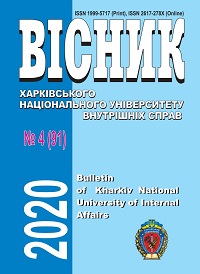Problem of Unity and Differentiation of Internal Labor Regulations
DOI:
https://doi.org/10.32631/v.2020.4.07Keywords:
unity, differentiation, legal regulation, internal labor regulations.Abstract
The author of the article, based on the analysis of scientific views of scholars and current legislation, considers the problem of unity and differentiation of internal labor regulations. It is established that the unity of internal labor regulations is that the requirements for the organization of the labor process are applied to all employees regardless of (a) form of ownership and management, type of activity and industry affiliation of enterprises, institutions or organizations, (b) type and form of employment contract, (c) circumstances that characterize the identity of the employee and the work performed by him, etc. Differentiation of internal labor regulations is objectively due to the development of social organization of labor, the division of labor in industries, varying degrees of mechanization, the presence of harmful and dangerous working conditions, involving employees who need special protection from harmful factors (women, minors, disabled, etc.). Different categories of employees have different opportunities, work in different conditions, and therefore one of the tasks of labor law in the organization of the labor process is to adapt the general rules to these different categories of employees to ensure the compliance with the principle of equality of rights and responsibilities. Differentiation improves the process of legal regulation, increases its efficiency contributing to the coverage of heterogeneous relations and penetration into their essence.
Just as the unity of internal labor regulations cannot exist without differentiation, so the differentiation of such regulations loses its meaning without its unity. These two categories cannot be opposed, because differentiation promotes unity, and unity creates the conditions for differentiation in the regulation of the labor process. This approach is important for building the system of labor law, the correct application of labor legislation and determining the perspectives for its development. In order to ensure the appropriate level of labor discipline, rational use of working time, improving the quality and productivity of labor by creating the necessary conditions for normal high-performance work, conscious and conscientious performance of their duties, employees must develop and approve sectoral internal regulations; and if for the public sector of the economy they should be given the status of mandatory, then for the non-state sector they should be exemplary.
Downloads
References
Kaminskaya P.D., 1927. Soviet Labor Law: Review of Current Legislation with Practical Comments [Sovetskoe trudovoe pravo: obzor deistvuyushchego zakonodatel`stva s prakticheskimi kommentariyami]. Kharkov: Yurizdat.
Begichev B.K., 1964. Subject Differentiation of Legal Regulation in Soviet Labor Law [Sub``ektnaya differentsiatsiya pravovogo regulirovaniya v sovetskom trudovom prave]. Sbornik uchenykh trudov Sverdlovskogo yuridicheskogo instituta, Iss. 2, pp. 136-144.
Zaikin A.D. (ed.), 1979. Soviet Labor Law [Sovetskoe trudovoe pravo]. Moscow: Yuridicheskaya literatura.
Protsevskii A.I. (ed.), 1982. Soviet Labor Law [Sovetskoe trudovoe pravo]. Moscow: Vysshaya shkola.
Volegov Yu.B., 1982. The Importance of Differentiation for Improving Labor Legislation [Znachenie differentsiatsii dlya sovershenstvovaniya trudovogo zakonodatel`stva]. Sovetskoe gosudarstvo i pravo, No. 1, pp. 48-55.



